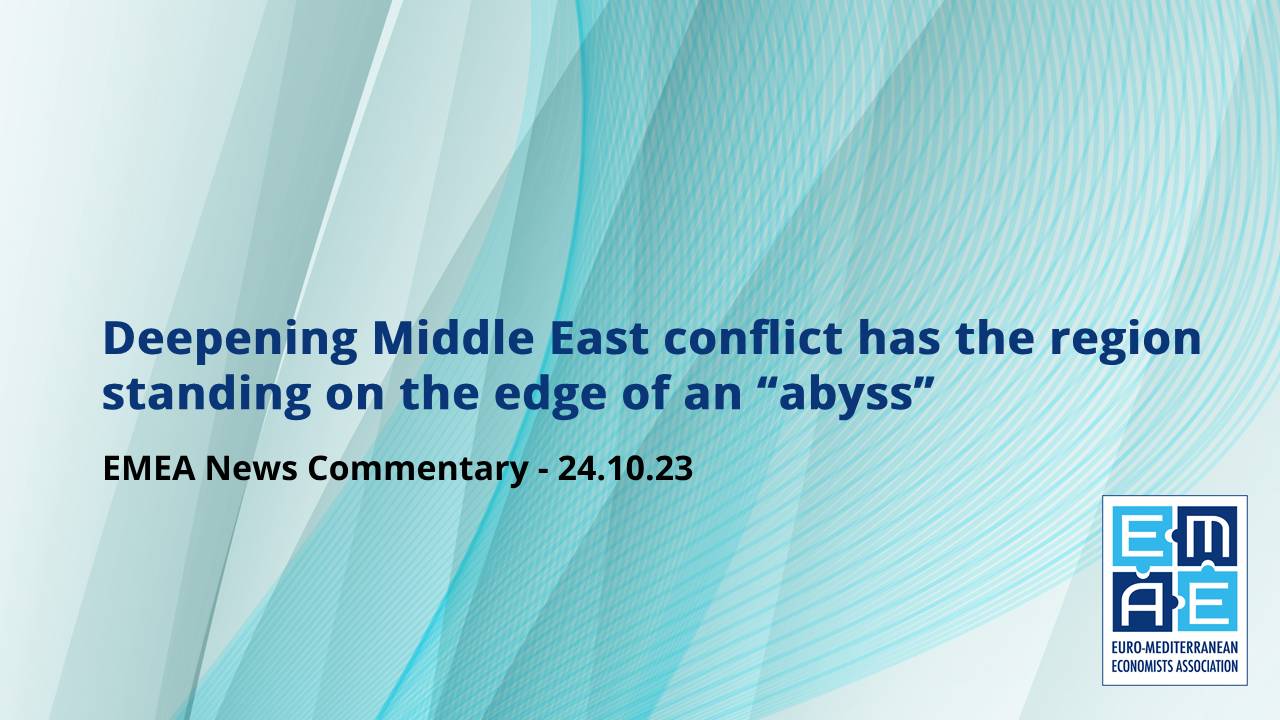With the daily death toll mounting in the intensifying conflict between Israel and Gaza, Jordan has warned that the Middle East stands at the edge of an ‘abyss’, says the Financial Times.
With diplomatic activity intensifying – including US President Joe Biden’s midweek arrival in Israel – the fear is that the unfolding violence could spiral into a wider regional conflict.
Just as Mr Biden was due to leave Washington for the Middle East, there was a deadly explosion at the Al-Ahli al-Arabi hospital location in central Gaza.
Hundreds are feared dead, according to information from the humanitarian organisation, the Palestine Red Crescent Society. The Palestinians blamed the Israelis for the attack, whilst the Israeli Defence Force (IDF) said it was the work of Palestinian Islamist militants.
It is believed to be the deadliest attack in the conflict since the Hamas attack on Israel on October 7th 2023.
In the immediate aftermath of the hospital blast, Jordan cancelled a proposed Summit in Amman with the US President. According to a Jordanian official, Mr Biden was due to meet the Jordanian and Egyptian leaders, as well as Mahmoud Abbas, President of the Palestinian Authority.
US National Security Council spokesperson John Kirby said Biden would, instead, speak by phone with Abbas and Egyptian president Abdel Fattah al-Sisi on the way back from Israel.
King Abdullah of Jordan had earlier called for humanitarian assistance to the Gaza Strip, whilst refusing to take in Palestinian refugees.
“The whole region is on the brink of falling into the abyss,” the King told a press conference in Berlin with German chancellor Olaf Scholz. “The threat that this conflict spreads is real; the costs are too high for everyone.”
Mr Scholz then travelled to the Middle East for further talks with Israeli and Egyptian leaders over getting aid into the besieged Gaza region. “We have to stop a regional conflagration,” he declared. “No actor should think it a good idea to intervene in this conflict from outside. It would be a grave, unforgivable mistake.”
The Hamas-run Health Ministry in the Gaza Strip said more than 200 people had been killed in the Gaza City hospital explosion and claimed that the blast had been caused by an Israeli airstrike. The FT said it was unable to verify this report.
The IDF told the AP news agency that it could not immediately confirm or deny the report. But an Israeli army spokesman later said intelligence indicated that the explosion was caused by a misfired rocket, launched from a cemetery near the hospital by Islamic Jihad, a militant group in Gaza.
Thousands of Palestinians have taken refuge in hospitals in Gaza, believing they would be safe from Israel’s bombardment of the densely populated enclave, which is home to 2.3 million Palestinians and controlled by Hamas. The area has been targeted by intense Israeli air and artillery strikes for more than a week.
Militants caused hospital blast says Biden
Upon his arrival in Tel Aviv, the US President said at a joint press conference with Israeli Prime Minister, Benjamin Netanyahu, that he was “deeply saddened and outraged by the explosion at the hospital in Gaza.”
And he told Mr Netanyahu: “Based on what I’ve seen, it appears it was done by the other team, not you [Israel]. But there’s a lot of people out there who are not sure, so we have to overcome a lot of things.”
Calling for “life-saving capacity to help the Palestinians who are innocent, caught in the middle of this”, Mr Biden added: “The world is looking. Israel has a value set like the United States does, and other democracies, and they are looking to see what we are going to do.”
Reuters said that whilst the President had given strong support for Israel since the October 7th Hamas attacks, the hospital blast had “wrecked White House plans for Biden’s emergency diplomatic mission to the Middle East.”
Mr Biden was “under intense pressure to win a clear Israeli commitment to alleviate the plight of civilians in the Gaza Strip, where 2.3 million Palestinians are under total siege, with no access to food, fuel, water or medical supplies.”
A time for ‘cool heads’
The scenes of destruction from the hospital were reported as “horrific even by the standards of the past 12 days, which have confronted the world with relentless images, first of Israelis slaughtered in their homes and then of Palestinian families buried under rubble from Israel’s retaliatory strikes.”
Palestinians were convinced the attack was carried out by Israel. There had been no warning for civilians to leave a hospital, which was being used as a shelter by thousands of Gazans already made homeless by Israeli bombing.
“This place created a safe haven for women and children, those who escaped the Israeli bombing,” hospital doctor, Ibrahim Al-Naqa, told Reuters. “We don’t know what the shell is called but we saw the results of it when it targeted children and ripped their bodies into pieces.”
After Mr Biden backed the Israeli account, other Western leaders called for caution, including Britain’s Foreign Secretary James Cleverly, who posted on X: “Getting this wrong would put even more lives at risk. Wait for the facts, report them clearly and accurately. Cool heads must prevail.”
The blast unleashed fresh anger on streets across the Middle East, even as Mr Biden sought to mediate in a conflict now threatening to sweep across borders.
There were clashes between Palestinians and police in the occupied West Bank — fuelling concerns that the war between Israel and Hamas could spill over into that territory.
The blast also drew condemnation from Muslim countries, including Turkey and Saudi Arabia, which blamed Israel. Jordan’s King Abdullah said the bombing, which he pinned on Israel, was a “massacre” and a war crime.
Fears of an escalating crisis
Meanwhile, the Financial Times reported that Iran has called for the Organisation of Islamic Countries to impose “urgent and thorough” oil sanctions on Israel, as well as to expel their ambassadors and establish a war-crimes tribunal.
Oil and gas prices surged as a result of the “escalating geo-political fall-out” from the war and Gaza hospital explosion. And the situation could be set to get much worse
According to Reuters, whilst market reaction has so far been limited, if the war was to broaden into a wider conflict, this “could deliver another shock to world growth and halt disinflationary forces in their tracks.”
Hamza Meddeb, director of the political economy programme at the Malcolm H. Kerr Carnegie Middle East Centre in Beirut, was quoted as saying: “Whether this conflict remains limited to a confrontation between Hamas and Israel or escalates into a broader regional conflict involving Iran’s proxy armed groups, notably Hezbollah, will have significant implications.
“Such an escalation could lead to increased oil prices, concerns about oil supply and the potential for a global economic downturn.”
Israel has been laying siege to Gaza in the wake of the Hamas attacks on October 7th that killed more than 1,400 Israelis, leaving the territory without mains electricity for six days and short of water.
The Israeli military said it was targeting Hamas militants, whom it accuses of hiding around hospitals and schools and using civilians as “human shields”. They have also accused Hamas of taking 199 hostages.
Palestinian health officials have said Israel’s bombardment of Gaza has killed more than 3,300 people with more than 1,000 missing in the rubble.
The UN said one of its schools in central Gaza had also been hit, killing at least six people, in what it said was “a flagrant disregard for the lives of civilians”.
At the same time, Israel has accused Iran of “escalating the situation” in the Lebanese northern border region. This followed intensifying exchanges of fire between the IDF and the Iranian-backed Hezbollah militia in southern Lebanon. The IDF said it would hold “the sovereign state of Lebanon . . . responsible for the terrorism from within its territory. We will exert a serious price.”
To deter Iran and Hezbollah, it’s been reported that the US has already deployed two aircraft carrier strike groups to the region, with a further 2,000 troops on a “prepare to deploy order”.
Humanitarian aid efforts
Meanwhile, US Secretary of State, Antony Blinken, said that the US and Israel had agreed to “develop a plan” to supply aid to Gazan residents and potentially create “areas to help keep civilians out of harm’s way”.
Hundreds of thousands of Palestinians have fled to the south of Gaza after Israel last week ordered them to leave the northern area of the enclave.
With a severe shortage of medicines, access to hospitals, cuts in water supply and the risk of disease, the UN has warned of “an unfolding humanitarian catastrophe” in Gaza. Drinking water is scarce, mains power is not available and supplies of fuel, medicines and food are running out, it has been widely reported.
Israel said that any “safe zones” for humanitarian aid would have to the south Gaza region, where there are believed to be up to 600 US nationals trapped. Despite international efforts, however, the Rafah crossing point for refugees and humanitarian aid between southern Gaza and Egypt has remained close. The Egyptian President, Abdel Fattah al-Sisi, has claimed that Israel’s siege of Gaza was aimed at pushing Palestinians to move to Egypt.
The US also wanted to see humanitarian assistance flowing into Gaza. “It’s not just a one and done, we want to see it sustained,” said American US National Security Council coordinator John Kirby.
UN deadlock
With the conflict threatening to spill over across multiple borders, the UN Security Council has so far failed to reach any consensus on an international response. Member States are at odds over the wording of a resolution aimed at establishing a ceasefire and humanitarian aid corridor to assist the Palestinians.
Jordan warns Middle East is at edge of ‘abyss’ (ft.com)
Jordan cancels Biden summit after deadly explosion at Gaza hospital
Biden, in Israel, says hospital blast caused by militants | Reuters
How Israel-Gaza war could impact global markets | Reuters
Explainer: What now, as Security Council deadlocks on Gaza? | UN News





